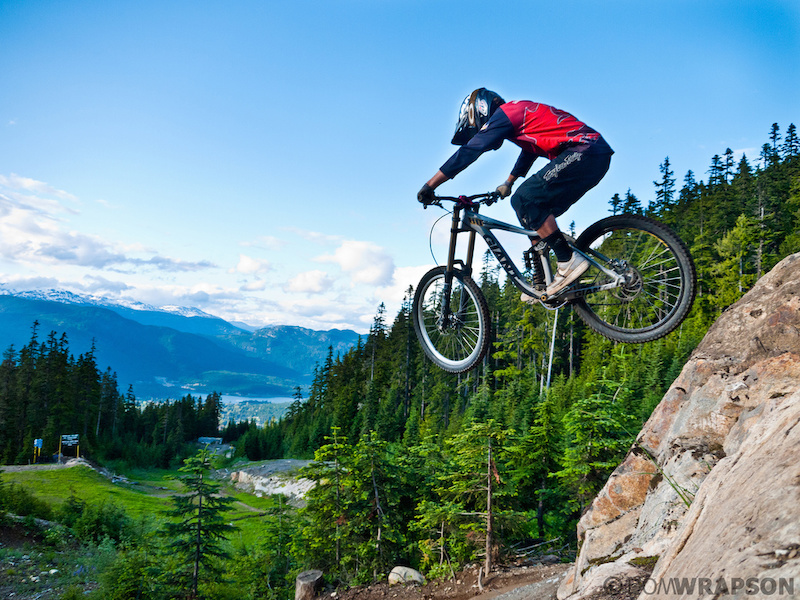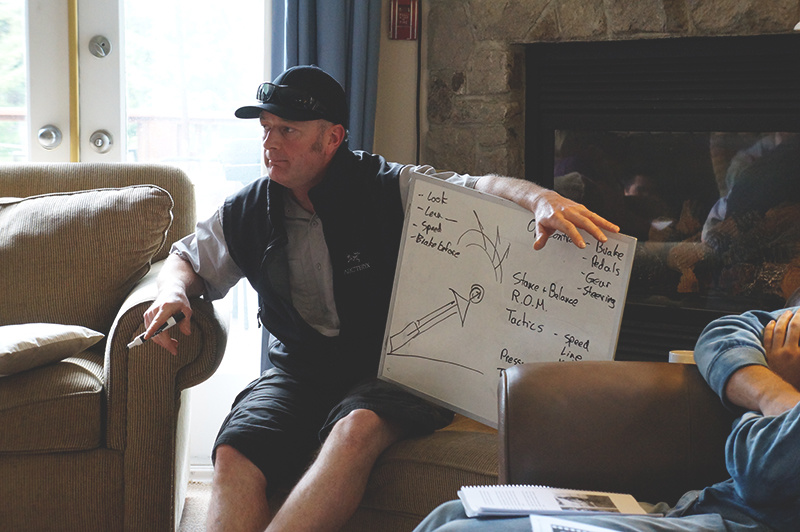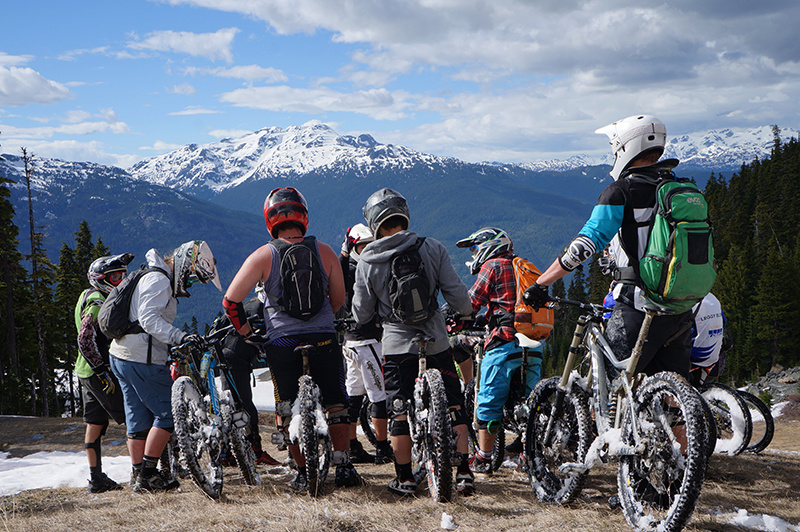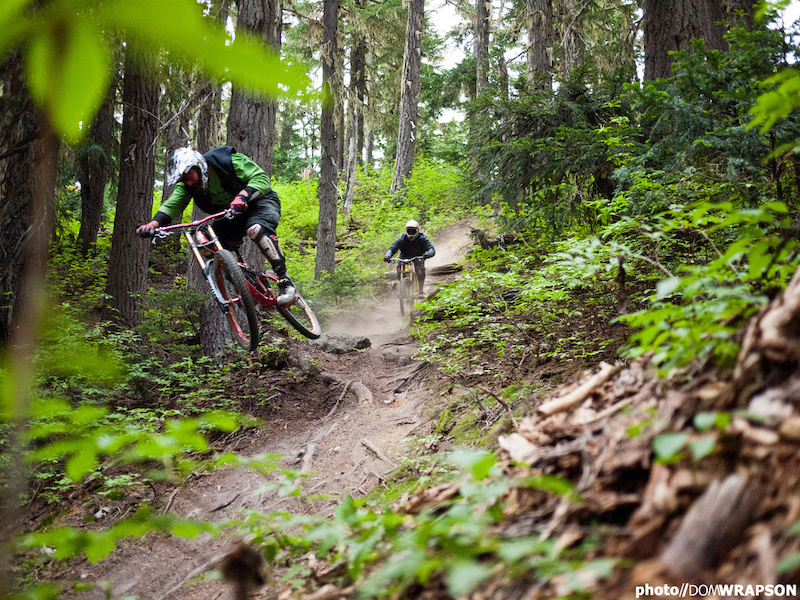Fancy working at one of the best bike parks in the world this summer? Then get yourself onto our Whistler Bike Park Instructor Academy that runs in May over three weeks and start your career in the Mountain Bike industry! Here is a little guide on what to expect from the course, and some advice on what kit to take and admin you need to do to secure your job.
 Want to start teaching people how to shred and get paid for it?
Want to start teaching people how to shred and get paid for it?This course will equip you with all the skills you need to teach not only the basics to beginners, but also jumps and drops to intermediate and advanced riders. It is coached by some of the best coaches in the industry, guys who have been teaching in the bike park from day one, the perfect people to learn from. Not only do you get this expertise, but this course is also the priority hiring course providing the majority of new guides for the mountain!
(If you are planning to stay on to work for Whistler Blackcomb, your job for the season will be dependent on you passing the course and having a short interview with the head supervisor of the Bike Park. Because of this we can’t 'guarantee' a position but as long as you have what it takes you will be offered a job).
Check out this short video edit of our 2013 Hiring Camp:
Peak Leaders Hiring Camp 2013
What level should your riding be at before you begin the course?Whilst it is important that you have a decent riding ability, you don’t have to be the next Danny Hart or Sam Hill before the course. Ideally, you should be comfortable at riding at minimum blue and red grade DH trails in the UK, as well as hitting medium sized jumps and drops. Although there is opportunity to develop your own riding during the 3 weeks, this is mainly focused on fine-tuning your demonstrations of skills and manoeuvres that you will teach to clients.
If you feel like you want to develop your riding as well as earn qualifications and a potential job at Whistler Bike Park, check out our longer rider development and coaches camp that starts later in the summer.

What equipment do you need?
A full suspension downhill or freeride type bike would be ideal, or an all mountain bike with 150mm+ travel. You’ll rack up A LOT of laps in the park during your time on the course and the rest of the season, and you will be able to enjoy it a lot more on bigger bike with more suspension! Not only will it give you more confidence riding on the big features of the trails and new terrain, but your clients will also be using these types of bikes so it will benefit with your explanations during teaching.
A full face helmet, along with elbow and knee pads are the minimum requirement for safety (riding every day takes it's toll!). A decent rain coat to keep you dry (it can be quite wet in Whistler in May) is also a great shout, as well as a few spare shorts and jerseys. A medium sized riding pack is also useful to have, since you will want to carry some spares while out riding, and it's even better if it comes with a water bladder for those scorching summer days on the hill.
What training and qualifications do you acquire on this course?
The 3-week course centres on the ‘Instructor Development Programme’ levels 1 and 2, that gives you everything you need to become a strong and confident guide. This is a qualification that is geared towards Bike Park and gravity-fed skills and guiding, although some of the content covered does cross over to the cross-country and trail riding disciplines (guiding and basic riding skills). This means you can guide outside of the park and broaden your horizons!
The IDP level 1 covers material that allows you to instruct beginners in the fundamental skills of downhill mountain bike riding, such as: body positioning, basic cornering and bike handling skills (steering and braking). Additionally, it provides you with the elements needed for a good lesson, such as: client safety, risk management/ emergency planning, guiding on trails, lesson planning, teaching and learning styles as well as all the theory behind all the technique you cover.
 Covering some theory (don’t worry, you don’t have to have a degree in physics for this bit!)
Covering some theory (don’t worry, you don’t have to have a degree in physics for this bit!)Level 2 covers skills for more advanced riders, and allows you to teach intermediate and advanced riders the progressions and maneuver breakdowns on jumps, drops and high speed cornering. It also concentrates on more high-level skills like tactics (line choice), mental focus and pressure control (pumping).

There is also a weekend course providing you with a First Aid qualification, which is compulsory for working in the park (if you have a First Aid qualification already check before you head out as it may be valid for working). This 2 day course over a weekend provides you with all the basic First Aid knowledge that you are required to know, and is internationally recognised.
Which other Bike Park's recognise the IDP level 1 & 2?
Currently Whistler Bike Park is the only resort that recognises the IDP level 1 and 2. However, as the course leader (Mike Johnstone) has been teaching in a number of parks across North America, it shouldn't be too long until it is recognised at other resorts as well. If you want to instruct and guide in Europe then our 'Coaches Camp' in August is more suitable as it includes the CTC qualification which is recognised across Europe.
Who is training is delivered by?
Your course leader will be Mike Johnstone, an immensely experienced rider and guide who has been working in mountain bike coaching since Whistler Bike Park started. One of the first few professionals in mountain biking, Mike previously raced at a very high level before putting his focus on guiding and teaching.
He (literally) wrote the book on bike park instruction and guiding, and has been around a number of other parks in both the USA and Canada teaching instructors. This really shows in his teaching, and he gives hints and tips to making a good lesson great, and keeping your clients safe.
There are two other guides that assist with the teaching, Duncan Mainland and Javi Munoz, who both have extensive experience not just coaching in the bike park, buts also as ski and snowboard instructors.
The three of them together really provide a well run course, and their collective experience is an invaluable asset in helping you to become a strong and confident bike guide.
 The immensely experience Mike Johnstone
The immensely experience Mike Johnstone ...with plenty of steeze to match
...with plenty of steeze to matchHow can you work in Canada? What VISA do I need?
As a non-Canadian resident, you’ll need to apply for a work VISA in order to be employed over the summer. The Canadian government runs a program called ‘International Experience Canada’, which is the best way to get a VISA. Available to those between 18-35 (although it does vary between countries), it allows you to work for up to one year in Canada. Currently, if you are from the UK you can only apply for two IEC initiatives.
For a more info relating to your specific country, check outthis link.
If you applying from the UK, usually there are around 5,000 places, and you complete your application in a two-stage process.
For the first stage you need to secure a 'Kompass Account'. This only concerns your basic information and checks your eligibility for the IEC program. These are released online in three ‘rounds’ (of around 1,300 visa’s each) and it is best to keep checking the website from the December before you want to do the course to find out when these are. It is really important you find out when these release dates are as it is the only time you can apply for the program!
Once you have completed and been accepted by the first stage, you then create an account and finish your application on the Canadian government website. For this you need a few more documents, including a copy of your passport, your CV and a police check from the UK Association of Police Offices (around £50). Then once you have all these you submit your application (costs $150 CAD). After that you should hear back within a month whether your application has been successful and get your VISA to enter Canada!
For more info on applying from the UK, a guide and FAQs on the process, head over to the IEC website.
What’s it like working for Whistler Blackcomb over the summer? What is the Pay like?
If you have no prior guiding experience before you complete the hiring camp, the pay rate is usually around $14 per hour. If you have worked guiding people before (such as through the CTC program in the UK) then you may get a little bit more. This is pretty reasonable, and if you work hard you can live comfortably in Whistler over the summer.
Where can you stay?
In terms of accommodation, your best bet is to stay in the Whistler Blackcomb Staff blocks a short ride down to the village. If you land a job once the course has finished, you can enjoy a sweet employee discount on rent (the staff rate is around $180 for 2 weeks, or $220 for the public). If you have a large group and want to stay a bit closer to the village then you can look into getting a private place, but this is normally more expensive and can be hard to find if you try and sort it mid season.
How much free riding time do you get?
There is plenty of time to ride outside of work, and although it can get busy during July and August (peak of the season), the lifts are open until 7.30/8pm during these months so you have time to smash laps after work! Nice to ride at this time as well since it is usually not so hot.
Business is usually a little slower during Crankworx since so many people want to spectate all the events and check out the trade stall, which allows you to do the same! Great time to check out what tricks are being thrown down on the slopestyle course, checking out the latest bikes on display at the trade stands or enjoying free samples of clif bars and coca cola being handed out!
What is the deal if you wanted to work at Whistler the following summer? Can you get a Sponsored VISA?
Unfortunately, Whistler Blackcomb cannot sponsor VISA applications for bike park employees (unlike for the ski side of things), however, there it no problem with reapplying for an IEC VISA the next year or two after your first season and then apply to Whistler Blackcomb as returning staff (just keep an eye on the job section of the Whistler Blackcomb website).
If you aren’t from the UK and your second IEC visa depends on having an offer of employment, have no fear, just mention this to the employee office and they might be able to sort you out with a letter for your application for the next season.
What is the accommodation set up in Whistler for the course?
We have partnered up with Bear Back Biking for your accommodation during the course. These guys know how to look after mountain bikers, providing a home to some of the Scott sports sponsored athletes during Crankworx and Polygon pre-season testers. Their chalet has a killer bike workshop housed in the basement, a patio equipped with BBQ and hot tub and en suite rooms, all located only a 10 minute ride from the lifts. They also provide breakfast and dinner to keep you fueled throughout the course (as well as afternoon cake for when you get in after a hard days riding), and the food is top quality.
 Bear Back biking's Alta Vista Chalet
Bear Back biking's Alta Vista Chalet The workshop is prime! (More bike storage on stage right)
The workshop is prime! (More bike storage on stage right)So come join us in the summer! For further information on the course, head over to our website. Ski, Snowboard & Mountain Bike Instructor Courses & Camps
www.peakleaders.com | Tel: +44 (0) 1337 860 079
Join us onFacebook | Follow us on Twitter@PeakLeaders
0 comments
To post, please join, log in or connect to Vital using your Facebook profile Login with Facebook.





